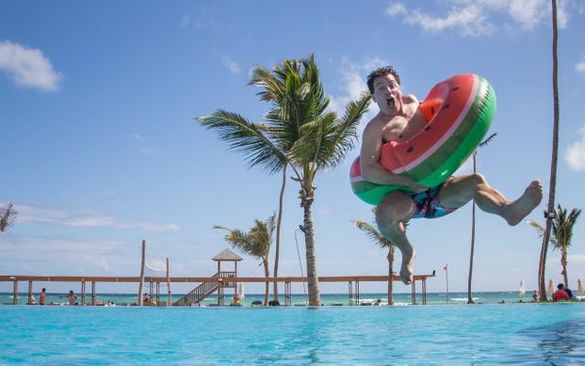 15 May 2019
15 May 2019
New study reveals what causes 'The Holiday Feeling' and how to maximise it
● TUI UK has worked with Dr Tali Sharot of the University College London's Affective Brain Lab to track the life cycle of 'The Holiday Feeling', from booking to beach
● The research shows we hit peak holiday feeling at hour 43, but we lose it less than 4 days (3.7 days) after unpacking our suitcases back at home
● 23% of holiday feeling moments occur before we step on the plane, a “Factor 30” list of key triggers reveals
● The findings will be used by TUI to explore ways to enhance the holiday feeling for guests, and to help them make it last even longer
Images (download link) - we.tl
YouTube video - youtu.be
14th May 2019: New research from TUI UK in collaboration with University College London's Affective Brain Lab has uncovered what triggers the difficult-to-define, but universally recognised, “holiday feeling” and unlocks how holidaymakers can retain the positive effects for longer.
With more than 30 million British holidaymakers set to jet off on a beach holiday this summer, leading holiday experts TUI reveal that they will hit their peak 'holiday feeling' just 43 hours into their trip. The findings also revealed a 'Factor 30' list of the key triggers that cause the biggest holiday feelings, with feeling the warmth of sun on your skin, the sound of the ocean, soaking up a picture-perfect view and having that first swim in the pool at the top.
However, the positive feeling we experience whilst away is a short-lived one, with the average traveller losing the holiday feeling less than 4 days (3.7 days) after unpacking their bags when they return home.
Dr Tali Sharot Director of UCL's Affective Brain Lab, who conducted a qualitative study of guests at a TUI Sensatori resort in the Dominican Republic commented: “It's interesting to see that a significant number of the key triggers that ignite positive holiday feelings happen before we even set foot on the plane. A brain imaging study we conducted in 2010 showed that just imagining a holiday can spark the feeling of anticipation and joy which activate the brain's “reward centre” - the striatum. This part of our brain receives input from dopamine neurons, providing us with anticipation of pleasure. In other words, just thinking about going on holiday – or planning your next holiday when you return home - will activate the reward system in your brain.”
One in four of the holiday feeling triggers revealed in the research relate to planning and anticipation (23%) - with booking the holiday, putting your out of office on, and checking in for your flight, all making the 'Factor 30' list.
Dr Sharot added: “Holiday “firsts” are also hugely important... Neuroscience studies have shown that novelty - the quality of something being new - is incredibly rewarding in itself. When things (places, experiences, items) are new an additional response is triggered in the brain's reward system, to give us a “spark” of positive feeling.”
Evidentiary to this, seeing your hotel room for the first time, having your first swim in the pool and having the first sip of your holiday cocktail all appear in the list.
However, the research also found that less than 4 days (3.7 days) after returning home the positive effects of our holiday disappear. Nearly half of us (44%) say this is due to having to return to a normal routine, coming back to colder and rainier weather (43%), as well as returning to work (39%).
In line with the 'reward centre' theory, one in three of us (33%) start researching our next getaway less than 3 weeks after returning from the last trip, and nearly a quarter of us (22%) book our next holiday less than a month after returning home.
With a huge 95% of us wishing we could make the holiday feeling last longer, TUI is exploring the findings and results of Dr Sharot's qualitative study to assess how they can help guests heighten the holiday feeling on resort, as well as before and after they go on holiday. With half (50%) saying that looking at photographs from the holiday helped prolong the feeling, one potential idea is installing 'holiday feeling' photo booths on resorts so guests can physically capture an image of them at 'peak time', and then re-live the moment at home. TUI is also developing a brand-new product launching later this year which will help to extend the holiday feeling back in the UK.
Katie McAlister, Chief Marketing Officer for TUI UK & Ireland said: “When our guests book a holiday with us we want to make the whole experience as enjoyable and stress-free as possible, from the moment they book, to the moment they see the beach. We all know, and have felt, the holiday feeling – that feeling of utter joy, excitement, anticipation and relaxation – and this research provides fascinating insights that will help us ensure that our guests enjoy their holiday feeling to the max. For example, understanding its life cycle will inform our pre and after travel communications and we will be creating something new soon that will quite literally 'bottle the holiday feeling' in a bid to make it last even longer.”
To coincide with the research, TUI enlisted the help of one of the UK's most exuberant personalities – John Barrowman – to bring the holiday feeling to life. The entertainer has taken on a brand-new role in a short film, showing holidaymakers exactly what the holiday feeling is during a stay at the TUI SENSATORI Resort Punta Cana, in the Dominican Republic.
To watch the “fab-u-lous” film, find out more about the research and to discover what type of holiday will give you the biggest holiday feeling, visit: www.tui.co.uk/theholidayfeeling
TUI's “Factor 30” list of top holiday feeling triggers:
1. Feeling the warmth of the sun on your skin
2. Stepping off the plane and feeling that wave of heat
3. Exploring the local area
4. Spending quality time with family and friends
5. Hearing the ocean
6. Soaking up a picture-perfect view
7. Not having to worry about day to day chores, like cooking and cleaning
8. Booking your holiday
9. Swimming in the clear blue sea
10. Having dinner with a sea view
11. Seeing your hotel room for the first time
12. Watching the sunset
13. Having your first swim in the pool
14. Looking at the weather report and seeing 100% sun
15. Trying new foods
16. Packing your suitcase
17. Feeling of sand between your toes
18. Checking in at the hotel
19. Discovering a new culture
20. Smelling the salty sea air
21. Having a drink at the airport
22. Taking your first sip of a holiday cocktail, like a Pina colada or mojito
23. Researching where to go on holiday
24. Smelling your sun cream
25. Getting ready for dinner or evening activities
26. Booking a holiday excursion or trip
27. Checking in to your flight online
28. Putting your out of office on
29. Checking your holiday countdown clock – on an app or email
30. Having an ice-cream
For more information, assets and imagery please contact the TUI PR team at lauren.singleton@tui.co.uk or call 01582 642 100.
END
Note to editors:
Qualitative research was undertaken by Dr Tali Sharot at the TUI SENSATORI Resort in the Dominican Republic in February 2019. Meanwhile TUI commissioned wider research with Censuswide also in February 2019, with 2,035 respondents.
TUI:
As TUI we offer a wide range of quality and reliable holidays with even more choice, more personalisation and more flexibility.
Its handpicked flagship hotels around the world fall under TUI SENSATORI – an affordable, luxury holiday experience featuring world class spas, gourmet dining and stunning locations; TUI SENSIMAR – stylish four or five star hotels in beach front locations exclusively for adults only; TUI BLUE – offering contemporary, premium hotels; TUI MAGIC LIFE – which take All Inclusive hotels to the next level; ROBINSON – offering a new experience every day and TUI FAMILY LIFE, which have been designed for families with children, featuring excellent kids' clubs, giving parents a care-free, relaxing holiday.
TUI UK and Ireland has a team of more than 10,000 employees and serves over six million customers each year. As part of TUI Group, it is the business behind the TUI, First Choice and Marella Cruises brands, as well as Crystal Ski Holidays and TUI Lakes & Mountains. Sub brands include TUI SENSATORI, TUI BLUE, TUI FAMILY LIFE, TUI SENSIMAR, TUI MAGIC LIFE, First Choice Holiday Villages and SplashWorld Resorts.
Dr Tali Sharot and the Affective Brain Lab:
Tali Sharot, a Professor of Cognitive Neuroscience at University College London, is the author of “The Influential Mind: What the Brain Reveals About our Power to Change Others” and “The Optimism Bias: A Tour of the Irrationally Positive Brain” and the director of the Affective Brain Lab. Sharot's team combines research in psychology, behavioural economics and neuroscience to reveal the forces that shape our decisions and beliefs. As well as conducting cutting edge behavioural neuroscience research, members of the Affective Brain Lab have helped some of the largest organizations in the US and UK to induce behavioural change, create decision-making policies, and shift beliefs.



